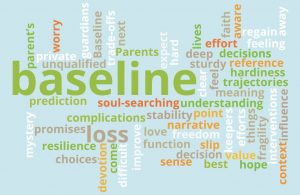6/4/2018
·Enable high contrast reading
A Parent's Narrative of Their Child is the Baseline

There is this thing we call the “baseline” and though we may not recognize it by its name, it has a deep influence on the lives of seriously ill children. It is a concept of what “well” is for a person at a time. The parents of seriously ill children are very aware of their child’s baseline, and put a lot of effort into understanding it and how it relates to their hopes for the next day and for their lives. It is the reference point: something to try to improve upon, at times. Something to regain, at others. Something that can slip away despite the best efforts, bringing with it soul-searching and the need for difficult decisions about what will come next.
The baseline is made up of many elements. There is the disease and its medical prognosis. There is the person, a growing child with special qualities. There is hardiness and fragility. There is stability and complications. There can be pain. Part of baseline is function, the interventions to support function, and sometimes its loss. There is hope. There is the deep nonverbal connection we feel when we meet our child’s eyes, and the worry about its loss. There is faith, there is love, there is resilience, there is devotion. There is the suffering of moments and the joys in other moments. There is mystery.
 A child’s baseline becomes especially significant when it is understood in the child’s context. That context is sometimes time and survival, and decisions that need to be made with urgency. An important part of making decisions rests in how we feel about our child’s baseline. Where is my child right now? It has to do with how sturdy things are feeling. It has to do with how much has been gained and how much has slipped away. It has to do with private promises we make towards our children.
A child’s baseline becomes especially significant when it is understood in the child’s context. That context is sometimes time and survival, and decisions that need to be made with urgency. An important part of making decisions rests in how we feel about our child’s baseline. Where is my child right now? It has to do with how sturdy things are feeling. It has to do with how much has been gained and how much has slipped away. It has to do with private promises we make towards our children.
I like to think that parents control the value in this, that a parent’s narrative of their child is the baseline. The medical team can help parents understand the likely trajectories of the disease, and anticipate the hard trade-offs and choices that will come. I am often reminded that the intense involvement of clinicians and support staff comes with commentary and judgment. Even with the greatest empathy, no one can see things as a parent does.
As parents become aware of their child’s baseline and what to expect, they often ask how they will know what to do. Their child’s life can feel so medicalized, so full of technology and medicine, that they can feel unqualified. At some level, a medical baseline needs a medical mind to appraise it. But the questions of what is at stake and what is worth it can only be answered by a loving parent. There is no obligation more essential than looking out for your baby. Parents are the guardians and keepers of the baseline.
In the deepest sense, I think it is the children who own their baselines. Their efforts with their baseline, whatever their age or condition, can come to represent the value and meaning of their lives. Their lives will embody not only what has happened to them but how they lived with it and through it. It is powerful to consider that no matter what the baseline is, it can provide a foundation for hope and aspiration. The simple privilege of feeling secure in our goals for each day rests on the foundation that we have, although it may be full of assumptions and predictions. With all its accompanied worries and concerns, a clear sense of the baseline allows for a kind of freedom and lofty hope.


